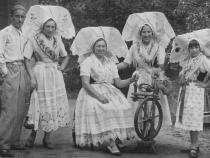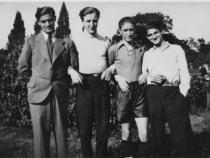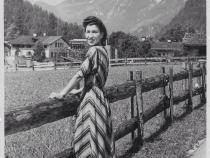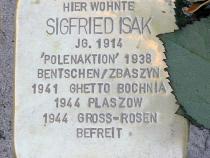Location
Schwedter Straße 22
District
Mitte
Born
05 July 1914 in Berlin
Abgeschoben
28 October 1938
to
Zbąszyń/Bentschen ("Polenaktion")
Deportation
in February 1944
to the
KZ Plaszow
Later deported
in October 1944
to the
KZ Groß-Rosen
Later deported
in November 1944
to the
Außenlager Langenbielau
Survived
Sigfried Isak (‘Sigi’) was born in Berlin on 5 July 1914. He lived with his parents and two sisters at Schwedter Straße 22 in Berlin-Mitte.
In his youth, Sigi liked to play club football and wanted to become a famous footballer. He was friends with both Jewish and non-Jewish boys.
In his interview in the Visual History Archive, Sigi said that he had not experienced anti-Semitism in Germany before Hitler came to power. He attended grammar school for eight years and then studied at business school, which he was not allowed to finish after Hitler assumed power. Sigi’s dream of a football career came to an end in 1935. He began an apprenticeship in a Jewish print shop.
The government’s declaration of anti-Semitism as an official policy was seen as a new and threatening development. In Jewish circles, the prospect of emigration was discussed more and more frequently. During this period, Sigi’s two sisters emigrated: Ruth to Palestine and Erna to Romania. That saved their lives. In 1937, Sigi Isak also decided to emigrate. But neither the British nor the American embassy wanted to help him.
He said in the interview that he was asked if he had any relatives in the USA: ‘I said, “No, but if I’m going to stay here they are going to kill me.” So I went to different embassies, but nobody wanted to help me. Nobody. They say they cannot help me. And then they picked me up in October '38.’
On 28 October 1938, the Police Presidium of Berlin issued an exclusion order against Sigfried Isak. Sigi stated that he was picked up by the police at 4:00 a.m. and taken to the Polish border. However, the Polish border guards did not want to let the expelled Jews in. As a result, they were forced to spend two days and two nights in a no man’s land on the border: ‘...it was bitter cold. It was October. It was cold like hell.’ The men were finally allowed to enter Poland but were not permitted to leave the border town of Zbąszyń. Seven months later, Sigi Isak was allowed to return to Berlin for seven days to sort out his finances. He was permitted to take along a small suitcase with clothes and was instructed to return to Poland afterwards.
At the beginning of the Second World War, Sigi Isak was in Bochnia because his father’s sister lived there. Hitler’s troops invaded Poland in autumn 1939 and established a ghetto in Bochnia in 1941. Ten thousand Jews were forced to live in the ghetto. Sigi Isak reported that he worked there in road construction and in an ammunition plant.
Sigi married Rachela Strum in the Bochnia Ghetto in 1943.
Sigi and his wife were deported to a concentration camp for the first time in February 1944. The camp was located in Plaszow, near Krakow. There, 60–80,000 Jews were forced to work 10–12 hours a day. Sigi Isak noted that it is there that he was given the number 11 360, which would replace his name until 1945. One day in October 1944, the prisoners had to leave the barracks. Sigi Isak was sent to Gross-Rosen concentration camp in Germany. He stayed there for four or five weeks, during which he was forced to carry stones. Five weeks later, in November 1944, the barracks had to be abandoned again, and Sigi Isak was taken to Langenbielau concentration camp. He stayed there for five months, along with thousands of other Jews whose task it was to dig trenches.
In early May 1945, the Langenbielau camp was liberated by the Soviet Army. The Russians then ensured that the Jewish prisoners received care.
After the end of the Second World War, it took Sigi Isak several months to regain his strength. He lived in Krakow, in a centre where Jews gathered to search for survivors. A Jewish community was very active there. Sigi Isak wanted to find his wife. He hoped she had survived Auschwitz. One day, Sigi Isak met a friend who told him that he had seen his wife recently: ‘So he said, “I saw her yesterday. She is in such-and-such town.” So I went there, found her, and then we went back to Germany. That was only place you could go in '45.’
Sigi worked in Munich for the ‘Joint’, the American Jewish Joint Distribution Committee (JDC). He worked in this organisation until he was able to emigrate to the USA on 2 January 1951 with the help of the IRO (International Refugee Organization). Sigi and Rachela Isak moved to San Francisco. There, Sigi worked in different professions. His wife Rachela also worked until they had their first child, a daughter named Gita. Three years later, a second daughter, Karen, was born.
In 1964 Sigi Isak opened his first store, Lakeside Liquor, which was a beverage shop at Mission and 18th Streets. He sold the business when he retired in 1981.
Rachela Isak died on 25 December 2012. Her husband Sigi died on 15 February 2013.
In his youth, Sigi liked to play club football and wanted to become a famous footballer. He was friends with both Jewish and non-Jewish boys.
In his interview in the Visual History Archive, Sigi said that he had not experienced anti-Semitism in Germany before Hitler came to power. He attended grammar school for eight years and then studied at business school, which he was not allowed to finish after Hitler assumed power. Sigi’s dream of a football career came to an end in 1935. He began an apprenticeship in a Jewish print shop.
The government’s declaration of anti-Semitism as an official policy was seen as a new and threatening development. In Jewish circles, the prospect of emigration was discussed more and more frequently. During this period, Sigi’s two sisters emigrated: Ruth to Palestine and Erna to Romania. That saved their lives. In 1937, Sigi Isak also decided to emigrate. But neither the British nor the American embassy wanted to help him.
He said in the interview that he was asked if he had any relatives in the USA: ‘I said, “No, but if I’m going to stay here they are going to kill me.” So I went to different embassies, but nobody wanted to help me. Nobody. They say they cannot help me. And then they picked me up in October '38.’
On 28 October 1938, the Police Presidium of Berlin issued an exclusion order against Sigfried Isak. Sigi stated that he was picked up by the police at 4:00 a.m. and taken to the Polish border. However, the Polish border guards did not want to let the expelled Jews in. As a result, they were forced to spend two days and two nights in a no man’s land on the border: ‘...it was bitter cold. It was October. It was cold like hell.’ The men were finally allowed to enter Poland but were not permitted to leave the border town of Zbąszyń. Seven months later, Sigi Isak was allowed to return to Berlin for seven days to sort out his finances. He was permitted to take along a small suitcase with clothes and was instructed to return to Poland afterwards.
At the beginning of the Second World War, Sigi Isak was in Bochnia because his father’s sister lived there. Hitler’s troops invaded Poland in autumn 1939 and established a ghetto in Bochnia in 1941. Ten thousand Jews were forced to live in the ghetto. Sigi Isak reported that he worked there in road construction and in an ammunition plant.
Sigi married Rachela Strum in the Bochnia Ghetto in 1943.
Sigi and his wife were deported to a concentration camp for the first time in February 1944. The camp was located in Plaszow, near Krakow. There, 60–80,000 Jews were forced to work 10–12 hours a day. Sigi Isak noted that it is there that he was given the number 11 360, which would replace his name until 1945. One day in October 1944, the prisoners had to leave the barracks. Sigi Isak was sent to Gross-Rosen concentration camp in Germany. He stayed there for four or five weeks, during which he was forced to carry stones. Five weeks later, in November 1944, the barracks had to be abandoned again, and Sigi Isak was taken to Langenbielau concentration camp. He stayed there for five months, along with thousands of other Jews whose task it was to dig trenches.
In early May 1945, the Langenbielau camp was liberated by the Soviet Army. The Russians then ensured that the Jewish prisoners received care.
After the end of the Second World War, it took Sigi Isak several months to regain his strength. He lived in Krakow, in a centre where Jews gathered to search for survivors. A Jewish community was very active there. Sigi Isak wanted to find his wife. He hoped she had survived Auschwitz. One day, Sigi Isak met a friend who told him that he had seen his wife recently: ‘So he said, “I saw her yesterday. She is in such-and-such town.” So I went there, found her, and then we went back to Germany. That was only place you could go in '45.’
Sigi worked in Munich for the ‘Joint’, the American Jewish Joint Distribution Committee (JDC). He worked in this organisation until he was able to emigrate to the USA on 2 January 1951 with the help of the IRO (International Refugee Organization). Sigi and Rachela Isak moved to San Francisco. There, Sigi worked in different professions. His wife Rachela also worked until they had their first child, a daughter named Gita. Three years later, a second daughter, Karen, was born.
In 1964 Sigi Isak opened his first store, Lakeside Liquor, which was a beverage shop at Mission and 18th Streets. He sold the business when he retired in 1981.
Rachela Isak died on 25 December 2012. Her husband Sigi died on 15 February 2013.








